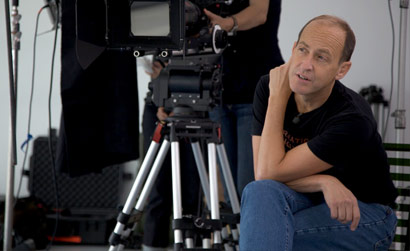

Charles Ferguson (L.) speaks to Jerome Fons, former managing director of Moody’s Rating Agency, for Inside Job.
Investigative reporting by documentary filmmakers about what makes the Wall Street wheels go round and how they spun out of control has up until now been the domain of movie muckrakers (see: Moore, Michael). But what if a businessman got in on the tell-all act and revealed, on camera, his firsthand knowledge about the U.S. economy? Such is the unique insider-looking-out perspective of corporate player-turned-filmmaker Charles Ferguson, with his exposé of runaway economic deregulation, Inside Job. I caught up with Ferguson by phone for a lively and at times contentious discussion about not exactly switching sides for his on-camera investigation, the politics of money, competing schools of thought related to good guy versus rotten apple tycoons, taking advice about business matters from layman Matt Damon (who narrates the movie) and exactly how objective an insider may or may not be.
Charles, part of your background is as a consultant to the White House and the Department of Defense, as well as to technology companies like Apple, Xerox, Motorola, Intel and Texas Instruments. So at what point did you switch sides? Because you were previously assisting the financial sector, as opposed to exposing it. Excuse me, that’s not true. I was in business before and I was also a policy analyst. I gave people policy advice on the questions I was studying, when they asked me to give them advice. When I was in business, I was in the software industry, the technology sector. I have no problem being in business; I’m not against business. And that’s a point that the film makes, that there are businesses and industries that do productive things. If business people behave honestly, do productive things and provide productive goods and services, then I think that’s great.
Well, did you ever encounter anything that disturbed you during those years, that you’ve put into your film? Hmm…Very tangentially, when I was in the software industry. I was in the software industry until 1996, when I sold my software company. It was an Internet software company. Because I was in that environment, I saw the beginnings of what became the dot com bubble—the ways that investment banks were cropping up and in fact inflating public offerings of companies that we kind of suspected really weren’t worth very much. So I did see a little bit of that at the time, and there’s some of that in the film. But no, for the most part I didn’t have contact with most of the things that I describe in the film.
On the one hand you categorize the perpetrators of the current financial crisis as impulsive risk takers, and then you go on to say they should be indicted and replaced with more benevolent capitalists. But there’s an economic school of thought that says the capitalist system creates these individuals, not the other way around. So the destructive trends would likely at some point simply continue. What are your thoughts about that? Well, that would not be a point of view to which I subscribe.
How come? I think there’s a lot of evidence that in fact business and industry and the private sector can behave much better. I think that a number of industries in the United States do behave better. We make that point in the film. The technology sector has a very different record than the financial sector in the United States. The financial industries of other nations didn’t behave this way. Canada didn’t suffer this crisis, because it has a properly regulated financial industry that conducts itself in a very different way. The same is true of several financial industries in European nations and in much of Asia.



